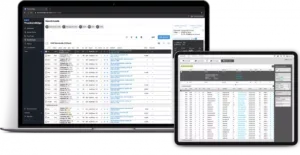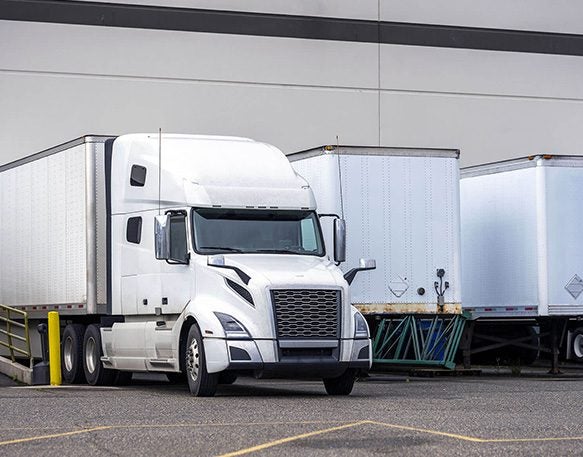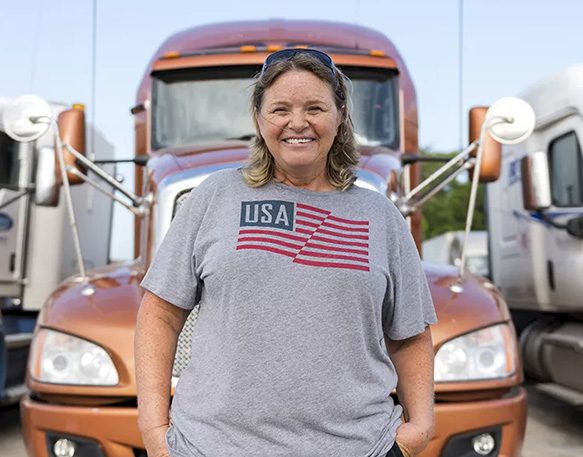by David McGill
I got into the industry when I was working as an accountant for friends who had just started their own trucking operation. Because the business was new, I ended up doing a lot more than just keeping the books, and over time, I realized that I had picked up the skills and knowledge I needed to open my own business.
Here are a few tips for how to start a trucking company that I’ve picked up over the years. By following these guidelines, you can make sure you’re dotting your i’s and crossing your t’s — and ultimately setting your business up for success.
What Do I Need to Start a Trucking Company?
Before you can begin operating, here are some bases you need to cover when starting a trucking company: business plan, insurance, and the right equipment.
 Your business plan should be based on research and analysis of the specific market you’ll be entering. Do you know how you’re going to find freight, for instance, or whether you plan to use a load board? Do you have an established relationship with brokers? Are there areas to avoid? Understanding how your business has to operate in order to be successful and then putting it in practical, on-the-ground terms is an important first step.
Your business plan should be based on research and analysis of the specific market you’ll be entering. Do you know how you’re going to find freight, for instance, or whether you plan to use a load board? Do you have an established relationship with brokers? Are there areas to avoid? Understanding how your business has to operate in order to be successful and then putting it in practical, on-the-ground terms is an important first step.
Your trucking business plan also needs to include financing information, including the type of equipment you need and whether you intend to purchase or lease those tools (all of which will affect your startup costs). Understanding your financing is one of the most important things you can do when starting your company. When you know your cost of operations, how much you’re going to pay drivers, how much fuel is, and so on, you’ll be able to pick loads that will profit your business.
If you plan on carrying loads across multiple state lines in any capacity, then you also need to apply for motor carrier authority. The team at DAT Authority can help you get set up with your own MC number, USDOT number and BOC-3 process agents, in addition to submitting your federal and state permits, and IFTA, IRP, and Unified Carrier Registration (UCR) forms. The process of applying for trucking authority takes weeks, and any mistakes or errors can lead to expensive setbacks that your new business doesn’t have time for — which is why trusting the experts at DAT Authority with your paperwork is often the best way to go. DAT Authority also comes with a free one-month subscription to the DAT load boards (as well as a 10 percent discount after that), so you can get your truck on the road as soon as possible.
On the legal and insurance side, the bare minimum required by the Federal Motor Carrier Safety Administration (FMCSA) for opening a trucking business is $750,000 in primary liability insurance. However, most brokers are going to require that you have coverage of $1 million or more, so in many cases, it makes sense to increase your coverage limit. You’ll also need register your business through your state’s website to officially launch your business and begin collecting revenue. Because the trucking industry is regulated at the federal level, the costs associated with starting a trucking business don’t typically vary state by state, except for insurance.
Finally, if you’re going to operate a trucking company, you need a truck! The two main options to consider are daycabs and sleepers. Daycabs are two-seater trucks without a bed in the back (which typically means the driver expects to be home or sleeping at a hotel every night), whereas sleepers are essentially small studio apartments on wheels, with a bed, refrigerator, TV, and potentially other amenities.
You’re also going to need a trailer. The specific type of trailer depends on the kind of freight you’re hauling. Dry freight requires a dry van trailer, for example, and cold freight like dairy and produce requires a refrigerated trailer (or “reefer,” as it’s known in the business). Heavy loads like logs, posts, and construction tools are typically carried on flatbed trailers (which aren’t enclosed). Depending on the type of freight you’re hauling, you may also need to invest in equipment like straps, chains, and tarps.
So, all told, how much does it cost to start a trucking company? Startup expenses can easily be in the neighborhood of $30,000. In my case, $20,000 of that went to purchasing my truck and equipment, and $10,000 went to insurance down payments and the required Department of Transportation compliance items. If you already have equipment, your costs will still likely land somewhere in the $5,000-10,000 range, but $30,000 is a fairly typical figure for starting a business with used equipment.
Trucking Services to Keep Your Trucks on the Road
If you’re brand new to the trucking industry, chances are that you won’t have any established relationships with brokers and shippers, so the next pressing question is how you’re going to find freight.
Load boards, like the one offered by DAT, are critical tools for new trucking companies because they allow you to see and book the loads that brokers and shippers are trying to move in real-time. The DAT load boards are easy to use and allow you to quickly search the largest on-demand freight marketplace for loads by origin, destination, equipment type, and departure date.
 Once you find a result that meets your search criteria, you can contact the broker to negotiate a rate and book the load. If there’s no immediate match, you can set an alert and be notified as soon as a load that meets your criteria becomes available. Not only that, DAT provides a useful mobile app that you can use to search and book loads from your phone. Plus, the DAT One app allows you to conveniently check fuel prices, search for nearby loads, find the closest truck stops and rest areas, parking, fuel prices, access turn-by-turn directions, and dock information through Dock411.
Once you find a result that meets your search criteria, you can contact the broker to negotiate a rate and book the load. If there’s no immediate match, you can set an alert and be notified as soon as a load that meets your criteria becomes available. Not only that, DAT provides a useful mobile app that you can use to search and book loads from your phone. Plus, the DAT One app allows you to conveniently check fuel prices, search for nearby loads, find the closest truck stops and rest areas, parking, fuel prices, access turn-by-turn directions, and dock information through Dock411.
Freight factoring is another service I recommend for small trucking businesses, as this will allow you to get paid faster and avoid waiting on brokers to pay their invoices. Here’s an example: let’s say I book and deliver a load through a broker. Brokers often operate on payment terms of 30 or 45 days, but as a small business, I may not have the ability to wait that long to stay on top of my bills and operating expenses. A freight factoring service allows me to get paid within a day or two in exchange for a small percentage off the top (typically 3 percent, but this may vary).
Once the load is delivered, I submit all of my documentation to the factoring company, and they will advance me the invoice payment minus their cut — meaning I’ll get $970 within a day or so for a $1,000 load. Factoring can make a huge difference for small trucking companies, especially those that don’t have a line of credit to pull from instead.
I also recommend getting a fuel card for a few reasons. A fuel card provides you with discounts on fuel, and may also come with payment terms, so instead of your drivers paying in cash at the pump every day, you will be able to charge the fuel and pay later. Once you combine fuel cards with factoring, it’s possible to create a system where you’re delaying payments and getting paid faster, which helps to minimize or mitigate any cash flow issues that could arise.
Tips for Running a Successful Trucking Business
As I mentioned earlier, the number one most important thing when you’re starting a trucking company is to thoroughly study your market. I’ve seen more than my fair share of new business owners get out of the trucking industry just as quickly as they got in. More often than not, it’s because they didn’t fully do their research, weren’t well versed in the industry’s requirements, or didn’t understand how a business needs to run in order to be successful. It takes a lot to operate a trucking business, and getting started can be one of the more intimidating stages of the process. Educating yourself and knowing what to expect is critical. In fact, it can be more important than the actual running of the business itself!
The good news is that there is plenty of information about how to start your own trucking company that is readily available online. My popular YouTube channel is a good place to start. Do your research, watch livestreams, and join the American Trucking Association. That way you can stay up-to-date on relevant laws and any regulatory changes that could affect your business. You could also consider taking a course on how to start a trucking company.
Another reason why understanding the financials is critical? In addition to everything else, you also need to know your per-mile cost of operations. For example, if fuel costs $0.50 a mile, your driver makes $0.50 a mile, and your various other expenses total $1.25 per mile, you need to be booking loads that pay at least that in order to break even. Ideally, you’ll be making enough of a profit to put aside a money reserve to help with vehicle maintenance and upkeep costs and fund the growth of the operation. Searching for the right loads ultimately comes down to knowing what your cost of operations is, and what target rates you’ll need to meet in order to cover your expenses.
My one infrastructural recommendation is to create systems, or set procedures for how your business works. Even if you only have one truck now, you’ll be doing yourself a favor down the line by setting up your systems so that as your business grows, as you hire more drivers, or as you obtain more trucks, you’re able to continue operating smoothly. Systems help to establish procedure, which is useful if you ever find yourself in the position of wanting to hire someone to help out, because there will already be a set plan in place for what they need to do on a daily basis.
When I was starting out, I created a system for how I book my loads, and another for how I communicate the relevant information to all necessary parties. Even something as simple as standardizing the email address that various parties use to communicate with me is a kind of system that contributes to the success of the business.
My final suggestion is to make sure that you stay compliant with all permits, registrations, and any other type of DOT-regulated items (such as electronic logging devices and your driver qualification files). There are quite a few compliance items that need to be checked regularly. If you employ multiple drivers, for instance, their licenses and medical cards will all expire at different points during the year. You are also responsible for the fuel tax returns that need to be filed every quarter.
Keeping track of all the different expiration and application dates to make sure nothing has slipped through the cracks can be a bit of an undertaking, especially when you start hiring additional drivers. This is another area where having a system in place — whether you manage the expirations and renewals yourself, or outsource the job to a third-party compliance company — is key to making sure that you don’t miss anything. Nobody needs a truck out of commission because of something as small as having an expired registration.
As you can see, there are a lot of moving pieces involved in starting your own trucking company. However, by making sure you understand your market, creating consistent procedures, and staying compliant in all facets of the business, you’ll be set up for success.
About the Authors
David McGill is an experienced fleet owner and accountant. He has created a popular trucking business channel on YouTube that helps entrepreneurs getting started in the trucking industry.
Get Started Today!
Get the most relevant matches for your business – the right load for the right truck at the right price, no matter where you are. DAT the largest load board, with more than 266 million loads posted annually. Find the load board package that best suits your business.




